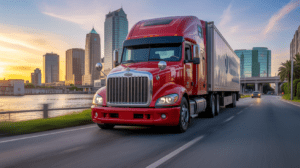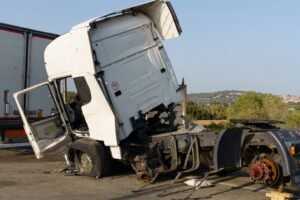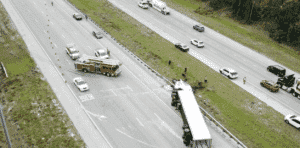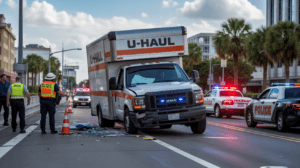Truck accidents in Tampa are all too common, especially near busy corridors like I-275, I-4, and the Port of Tampa. With heavy freight traffic, aggressive drivers, and constant construction, it’s easy for a routine drive to turn into a life-changing collision. If you or someone you love has been injured in a crash with a commercial truck, you deserve a legal team that puts your needs first and helps you take back control of your life.
At Anidjar & Levine, our Tampa truck accident lawyers handle the legal burden so you can focus on healing. From getting your car repaired to helping you access top medical care, we’re here to support you every step of the way, just as our Tampa personal injury lawyers have done for countless families across the region.
If you or a loved one has been injured in a truck accident in Tampa, you know how devastating it can be. The physical, emotional, and financial toll can be overwhelming. You don’t have to go through this alone. The experienced and compassionate Tampa truck accident lawyers at Anidjar & Levine are here to fight for you.
We have a proven track record of success in helping truck accident victims in Tampa and throughout Florida get the justice and compensation they deserve. We understand the complexities of truck accident cases and have the resources to take on even the largest trucking companies and their insurance carriers.
Why Choose Our Tampa Truck Accident Lawyers
When you’re up against a powerful trucking company and their insurance provider, you need a law firm with the experience, resources, and dedication to level the playing field.
You’re not a claim number to us. From day one, we set a plan: preserve black-box and ELD data, gather driver logs and dispatch communications, and document the vehicle’s condition before anyone “repairs” away critical proof. We coordinate closely with your providers, ensure specialists are looped in, and keep you updated so you’re never left guessing what comes next. We handle the insurance calls, scheduling, and paperwork, and we prepare each matter as if a trial were inevitable.
That pressure often drives serious offers. When it doesn’t, we’re ready.If your crash wasn’t with a commercial truck, we also help in severe car cases. See our Tampa auto accident lawyer and Tampa car accident attorney resources for non-commercial collisions.
- We Get Results: We have a proven track record of securing substantial settlements and verdicts for our clients. We are not afraid to take your case to trial to get you the maximum compensation you deserve.
- We Are Truck Accident Specialists: Unlike other firms that handle a wide range of personal injury cases, we have a dedicated team of lawyers who specialize in truck accidents. This specialized knowledge gives us a significant advantage in these complex cases.
- We Have the Resources to Win: Truck accident cases often require extensive investigation, expert testimony, and significant financial resources. We have the resources to match any opponent, regardless of their size or power.
- We Care About Our Clients: We understand that you are going through a difficult time, and we are here to provide you with the compassionate and personalized legal representation you deserve. We will be with you every step of the way, from your initial consultation to the final resolution of your case.
When an 80,000-lb. commercial vehicle meets weekday traffic on I-275, I-4, or the Selmon, even a “minor” mistake can change a life.
Our Tampa truck accident attorneys:
-
Move fast to preserve black-box/ELD data, driver logs, dash cam footage, and telematics before they’re overwritten.
-
Map liability across every potential defendant — driver, carrier, broker/shipper, maintenance contractor, loader, manufacturer, and even road contractors when appropriate.
-
Quantify damages with treating providers and experts (life care planners, vocational analysts, economists).
-
Negotiate aggressively with insurers and, when necessary, pursue cases to achieve fair results.
-
Keep you informed with direct contact, regular updates, and help scheduling care, repairing/replacing your vehicle, and managing the paperwork.
Not a truck crash? We also handle complex car cases. See our Tampa auto accident lawyer resources for non-commercial collisions.
Our Client-Centered Approach For Tampa Truck Accidents
- Listen to your story: We want to understand how the accident has impacted your life so we can effectively advocate for you.
- Thoroughly investigate your case: We will gather all the evidence, including police reports, witness statements, and trucking company records, to build the strongest possible case for you.
- Handle all communication with the insurance companies: We will deal with the insurance adjusters so you can focus on your recovery.
- Keep you informed every step of the way: We will provide you with regular updates on the status of your case and answer any questions you may have.
Tampa Roads Where Truck Collisions Commonly Occur
Tampa’s layout creates unique trucking hazards. The I-275 corridor—including approaches to the Howard Frankland—forces frequent merges and speed changes. The I-4 interchange concentrates traffic and work-zone activity.
U.S. 301 and SR-60 carry heavy freight, while Dale Mabry and Gandy blend commercial vehicles with dense urban driving. Near Port Tampa Bay, short decision windows and complex merges increase risks.
Understanding these corridors helps us reconstruct visibility, stopping distances, grade and curve effects, and the impact of lane closures.
-
I-275 (Howard Frankland Bridge approaches, downtown curves)
-
I-4 (I-275 stack/interchange)
-
U.S. 301 & SR-60 (heavy freight corridors)
-
Dale Mabry Hwy & Gandy Blvd (turning semis + aggressive urban traffic)
-
Port Tampa Bay access roads (high truck volume, complex merges)
Localizing your claim matters: these corridors affect stopping distances, visibility, grade/curve dynamics, and work-zone hazards that shape liability and reconstruction.
Client Success Story: A Tampa Truck Accident Victim’s Journey to Justice
“After my accident, I was lost and didn’t know where to turn. The team at Anidjar & Levine took care of everything. They fought for me and got me a settlement that was more than I ever expected. I can’t thank them enough for their help.” – John D., Tampa, FL
John was driving home from work on I-275 when a semi-truck rear-ended him. The impact was so severe that it left him with a serious back injury that required surgery. The trucking company’s insurance company initially offered him a lowball settlement that wouldn’t even cover his medical bills.
John came to us for help. We immediately launched a full investigation into the accident and found that the truck driver had been texting while driving. We also discovered that the trucking company had a history of safety violations.
How Tampa Truck Accident Cases Differ From Car Crashes
Truck claims involve larger insurance towers, more defendants, and a federal regulatory overlay. The Federal Motor Carrier Safety Regulations govern hours of service, inspections and maintenance, driver qualifications, and cargo securement.
Much of the decisive proof—and the spoliation risk—lives in the carrier’s systems: EDR/ECM downloads, ELD records, dispatch and routing, maintenance tickets, and bills of lading.
Our team sends immediate spoliation notices, seeks court protection when necessary, and engages reconstructionists to secure the facts before they disappear.
-
Higher stakes: Catastrophic injuries and larger insurance towers.
-
Complex federal overlay:FMCSA regs (e.g., Hours-of-Service), vehicle inspection/maintenance, driver qualification, cargo securement.
-
Evidence spoliation risk:ECM/EDR, ELD, routing, dispatch, maintenance tickets, fuel receipts, and bill of lading can disappear quickly.
-
Many defendants: Liability often spreads beyond the driver to corporate entities and contractors.
Our litigation team sends immediate spoliation notices, pursues temporary restraining orders if necessary, and retains accident reconstructionists to lock down the record early.
Who May Be Liable in a Tampa Truck Accident
Responsibility often extends beyond the driver. Motor carriers can be liable for hiring, training, supervision, and pressuring employees to adhere to schedules.
- The Truck Driver: If the truck driver was negligent (e.g., speeding, distracted, or driving under the influence), they can be held liable for the accident.
- The Trucking Company: Trucking companies can be held liable for the negligence of their drivers. They can also be held liable for their own negligence, such as hiring an unqualified driver, failing to properly train their drivers properly, or encouraging their drivers to violate safety regulations.
- The Cargo Loader: If the cargo on the truck was not loaded and secured correctly, the company that loaded the cargo may be held liable if the cargo shifts and causes an accident.
- The Vehicle Manufacturer: If a defective truck part caused the accident, the manufacturer of the truck or the part may be held liable.
- Maintenance Providers: If the trucking company outsources its maintenance to a third-party provider, that provider may be held liable if their negligence caused the accident.
- The Truck Owner: In some cases, the owner of the truck may be a separate entity from the trucking company. If the owner failed to maintain the truck properly, they may be held liable.
- A Government Entity: If the accident was caused by a dangerous road condition, such as a poorly designed intersection or a lack of warning signs, a government entity may be held liable.
We build the theory of liability from evidence outward — not guesses inward.
Florida Laws You Should Know (Updated for 2025)
Most Florida personal injury claims must be filed within two years of the crash; wrongful death actions generally share the two-year deadline, measured from the date of death. Florida’s modified comparative negligence reduces your recovery by your share of fault and bars recovery if you’re more than 50 percent responsible.
In mixed car-truck scenarios, PIP rules can still affect care coordination and early billing, so prompt treatment is smart both medically and legally. Your situation may involve exceptions; call us for guidance tailored to your facts.
-
Statute of limitations (most injury cases):2 years from the crash date; wrongful death: 2 years from date of death. Waiting risks dismissal and lost evidence.
-
Modified comparative negligence: Your recovery is reduced by your percentage of fault; barred if you’re >50% at fault.
-
PIP 14-day rule (car cases): If your crash also involves PIP issues, prompt treatment preserves benefits (often relevant in mixed car/truck scenarios with multiple coverages).
We apply these rules strategically when negotiating or filing suit. (Legal standards summarized here; your situation may involve exceptions. Call for advice specific to your facts.)
Common Types of Truck Accidents in Tampa
Commercial truck accidents are often more complex and devastating than typical car accidents. Understanding the different types of truck accidents can help you understand how your accident occurred and who may be at fault.
Some of the most common types of truck accidents we see in Tampa include:
- Rear-End Collisions: Due to their size and weight, trucks require significantly more time to stop than passenger vehicles. When a truck driver is following too closely or is not paying attention, they can easily rear-end a smaller vehicle, causing serious injuries.
- Jackknife Accidents: This occurs when the trailer of a truck swings out to the side, forming a 90-degree angle with the cab. Sudden braking, sharp turns, or slippery road conditions often cause jackknife accidents.
- Rollover Accidents: Trucks have a high center of gravity, which makes them more susceptible to rolling over, especially when a driver takes a turn too quickly or is driving in high winds.
- Underride Accidents: These are some of the most horrific types of truck accidents. An underride accident occurs when a smaller vehicle slides underneath the trailer of a larger vehicle, such as a truck. These accidents are often fatal.
- Blind Spot (No-Zone) Accidents: Trucks have large blind spots on all four sides. When a truck driver changes lanes or makes a turn without checking their blind spots, they can easily collide with a vehicle in their no-zone.
- Tire Blowouts: A tire blowout on a large truck can be catastrophic. The driver can lose control of the vehicle, causing it to swerve into other lanes or roll over.
- Wide Turn Accidents: Trucks need a lot of space to make turns. When a truck driver misjudges a turn or fails to see a vehicle in their path, they can cause a serious accident.
- T-Bone (Side-Impact) Collisions: These accidents often occur at intersections when a truck driver fails to yield to oncoming traffic, such as when they run a red light or stop sign.
- Head-On Collisions: These are the most dangerous types of accidents and are often fatal. Head-on collisions with trucks can occur when a truck driver falls asleep at the wheel, is driving under the influence, or loses control of their vehicle.
- Cargo Spills: If a truck’s cargo is not secured correctly, it can fall off the truck and onto the roadway, creating a hazard for other drivers.
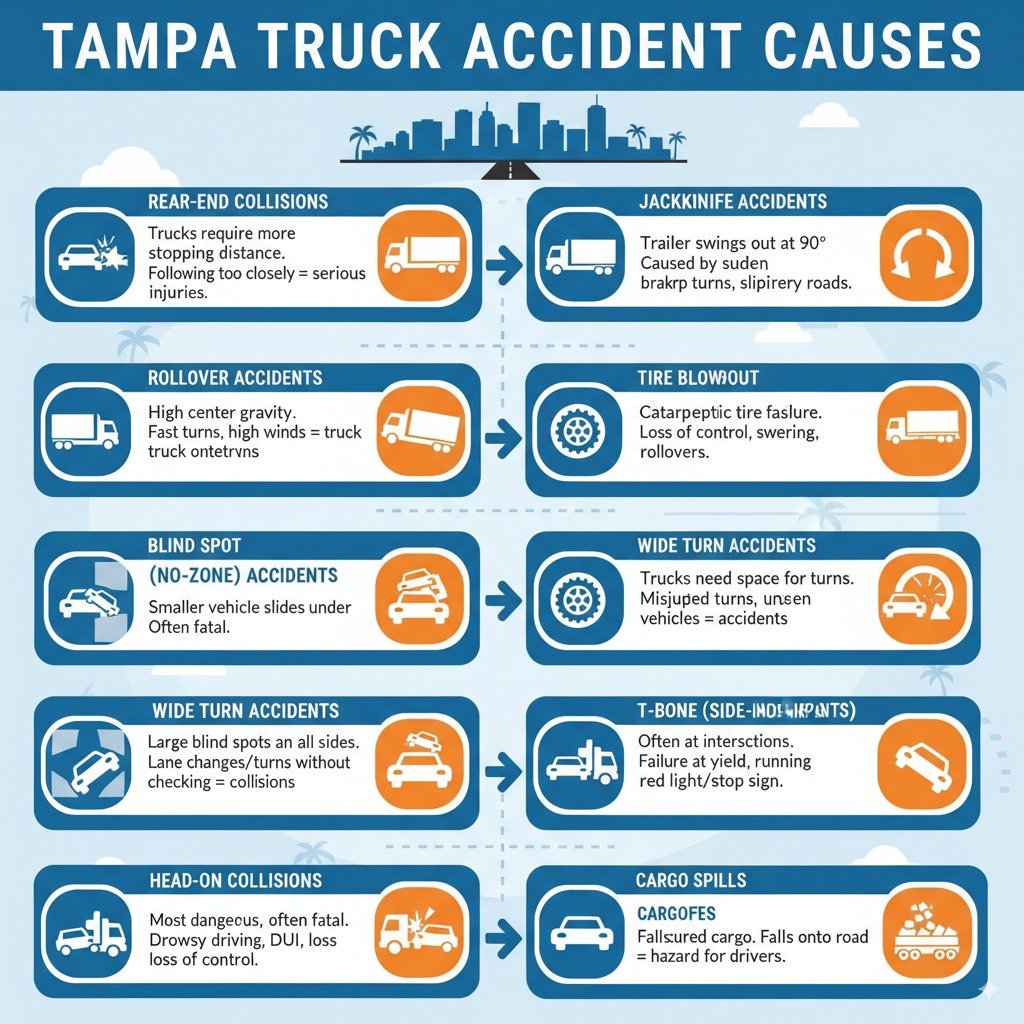
What Causes Truck Accidents in Tampa?
Fatigue remains a top factor, especially with tight delivery windows and port turn-times. Distracted driving—everything from navigation and dispatch tablets to texting—steals precious reaction time. Speeding or traveling too fast for Florida’s sudden storms leads to hydroplaning and loss of control. Poor maintenance shows up as thin brake linings, out-of-adjustment brakes, or bald tires.
Cargo can shift, overload, or hang out of spec. Work-zone dynamics at the I-275/I-4 interchange routinely complicate lane guidance. Each cause points us to different defendants and different forms of proof.
- Driver Fatigue: Truck drivers are often under pressure to meet tight deadlines, which can lead to them driving for long hours without adequate rest. Fatigued driving is a major cause of truck accidents.
- Distracted Driving: Texting, talking on the phone, eating, or using a GPS while driving are all forms of distracted driving that can have deadly consequences.
- Speeding and Aggressive Driving: Truck drivers who speed or drive aggressively are a danger to everyone on the road.
- Driving Under the Influence (DUI): Driving under the influence of alcohol or drugs is illegal and extremely dangerous, especially for truck drivers.
- Improper Training or Hiring: Trucking companies have a responsibility to properly train their drivers and to hire drivers with a safe driving record.
- Poor Maintenance: Trucking companies are required to regularly inspect and maintain their vehicles. When they fail to do so, it can lead to mechanical failures that cause accidents.
- Overloaded or Improperly Loaded Cargo: Overloaded trucks are more difficult to control and can be more likely to roll over. Improperly loaded cargo can shift during transit, causing the driver to lose control.Defective Truck Parts: Sometimes, a truck accident is caused by a defective part, such as a faulty tire or brake system. In these cases, the manufacturer of the part may be held liable.
Damages You May Be Entitled to Recover After a Tampa Truck Accident
- Medical Expenses: This includes all of your past, present, and future medical bills related to the accident, such as hospital stays, surgeries, doctor’s visits, physical therapy, and prescription medication.
- Lost Income and Reduced Earning Capacity: If you have been unable to work due to your injuries, you can recover your lost wages. If your injuries have permanently affected your ability to earn a living, you can also recover damages for your reduced earning capacity.
- Pain and Suffering: This is compensation for the physical pain and emotional distress you have endured as a result of the accident.
- Property Damage: You can recover the cost of repairing or replacing your vehicle and any other personal property that was damaged in the accident.
- Wrongful Death Damages: If you have lost a loved one in a truck accident, you may be able to recover damages for your loss of companionship, support, and services, as well as for funeral and burial expenses.
There’s a Deadline to Take Legal Action After a Tampa Truck Collision
If you’ve been injured in a truck accident, it’s important to know that Florida law now gives you just two years to file a personal injury lawsuit, perFlorida Statutes § 95.11. This statute of limitations starts on the date of the accident. If you miss it, you could lose your right to seek compensation entirely.
This two-year limit also applies to wrongful death claims, measured from the date of your loved one’s passing. In some cases, shorter deadlines may apply. While two years may sound like plenty of time, waiting can put your case at risk. Key evidence can be lost or destroyed. Witness memories fade. The sooner you contact our team, the sooner we can begin building a strong case on your behalf.
What To Do After A Truck Accident
Your health comes first: seek medical care and describe every symptom, even the ones that feel minor. Photograph vehicles, debris, skid marks, lanes, and signage if it’s safe to do so. Preserve your vehicle until we advise otherwise; crush patterns and transfer evidence are often central in reconstruction.
Avoid recorded statements before speaking with an attorney, and contact us quickly so we can secure black-box and ELD data and coordinate inspections.
-
Call 911 and get medical care; describe all symptoms.
-
Document the scene (photos, dash cam, witness info).
-
Don’t give recorded statements to insurers before you speak with counsel.
-
Preserve your vehicle (necessary crush/transfer evidence).
-
Call us early so we can send spoliation notices and coordinate inspections.
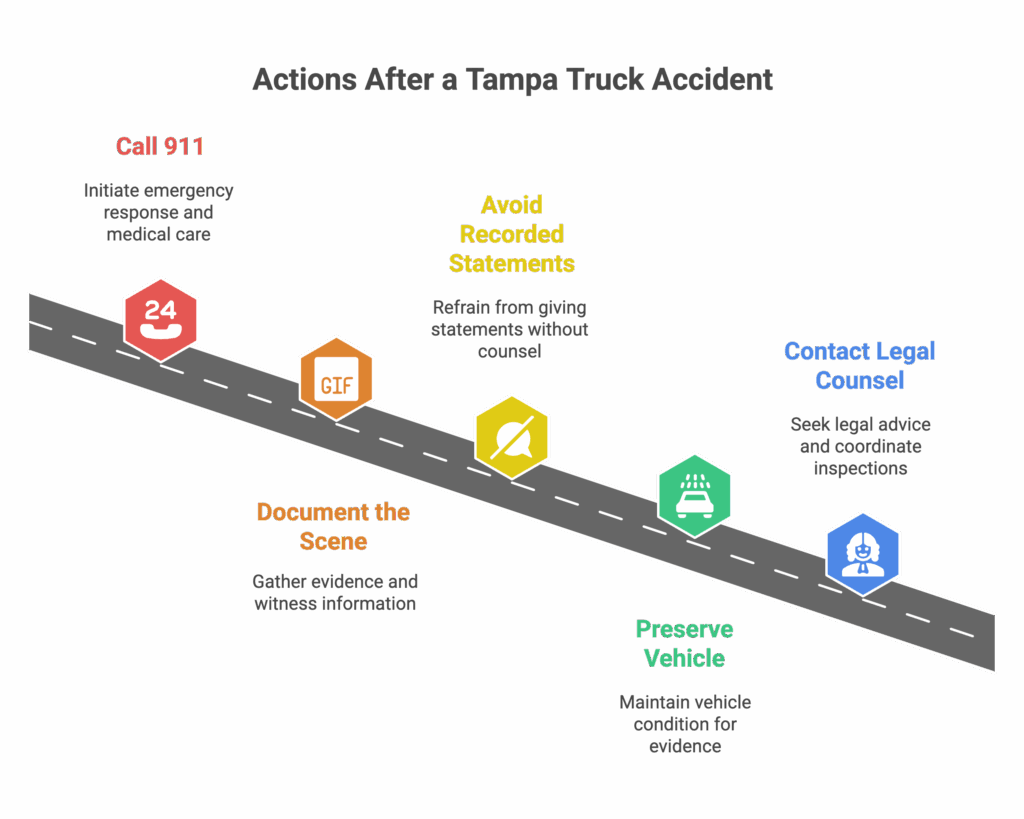
The Evidence We Move Quickly To Secure
Time is the enemy. We prioritize ECM/EDR downloads, ELD records, driver logs, dispatch and routing data, maintenance and inspection files, telematics, cargo paperwork, and site video from traffic cameras or nearby businesses. When work zones are involved, we pull traffic control plans and lane-closure logs.
For the driver, we obtain the qualification file, training records, and prior violations.
Then we knit it all together with an expert team so numbers, not just memories support the story of what happened.
-
Black-box (ECM/EDR) & ELD downloads
-
Driver logs, dispatch/routing, bill of lading
-
Maintenance & DVIR records, brake measurements, tire data
-
Telematics (speed, hard-braking, GPS breadcrumbs)
-
Work-zone plans & lane-closure logs
-
Driver qualification file (DQF), training, prior violations
-
Carrier safety scores, prior incident history
-
Third-party video (port gates, traffic cams, business exteriors)
Tampa Truck Accident Types of Damages
Truck impacts often mean serious injuries—orthopedic trauma, brain injuries, spinal cord injuries, internal damage, or complex polytrauma. We pursue medical bills, future care, wage loss, diminished earning capacity, and property damage alongside non-economic losses such as pain, mental anguish, loss of enjoyment, and scarring.
In extreme misconduct—intoxication, falsified logs, or willful safety violations—we evaluate punitive damages. For families facing a wrongful death, we pursue funeral and burial costs, loss of support and services, and other statutory losses with care and urgency.
Economic damages
-
ER/hospital/surgery, specialists, PT/OT, home health, future medicals
-
Wage loss, diminished earning capacity
-
Vehicle and property damage, transportation, out-of-pocket costs
Non-economic damages
-
Pain, mental anguish, loss of enjoyment, loss of consortium
-
Scarring/disfigurement, disability/impairment
Punitive damages
Where gross negligence (e.g., intoxication, falsified logs) is proven, we evaluate punitive exposure.
Wrongful death
Funeral/burial, loss of support/services, and other statutory losses.
How We Value A Tampa Truck Accident Case
Valuation is a combination of medicine, economics, and liability. We consult with your treating providers, bring in life-care planners to map future needs, and work with vocational and economic experts to quantify how the injury changes your work life and financial future.
On the liability side, we weigh the strength of the evidence, coverage limits, and comparative fault arguments. From there, we press for a settlement that reflects trial risk—because we’ve been preparing for trial all along.
We coordinate with treating doctors and experts to model future care, analyze work-life expectancy, and calculate present value damages. We also scrutinize liability strength, coverage limits, and comparative fault defenses. Then we pressure insurers with trial-ready prep.
Tampa Truck Accident Case Study (Anonymized Example)
A tractor-trailer near the I-4/I-275 interchange rear-ended a commuter during a construction lane shift. Initial police notes were vague; they blamed “inattention.” The data said more. ECM downloads captured a late hard brake from 62 to 0 mph with less than 1.5 seconds of reaction time.
ELD records and fuel receipts suggested hours-of-service violations—a post-crash inspection documented brakes that were out of adjustment. The work-zone plan showed a taper that was too short for the posted speed. We pursued claims against the driver, the carrier, the maintenance contractor, and the road contractor.
After expert depositions and a Daubert challenge were successfully addressed, the defendants resolved the case for policy limits plus an excess contribution. Every case is different, and no result is guaranteed; however, the method—evidence first, liability mapped carefully—remains unchanged.
-
ECM/EDR showed a late, hard brake from 62→0 mph with <1.5 sec reaction;
-
ELD + fuel receipts suggested HOS non-compliance;
-
Brake inspection revealed out-of-adjustment pushrod stroke on two chambers.
-
Work-zone plan indicated improper taper length for the posted speed, amplifying risk.
We brought claims against the driver, carrier, maintenance contractor, and the road contractor. After expert depositions and a Daubert challenge were successfully addressed, the case resolved for policy limits plus an excess contribution. (Results depend on facts; no guarantee of outcome.)
Comparative Fault And Your Recovery
Even if the defense argues you contributed to the crash—an abrupt lane change, a missed signal, a speed choice—Florida law may still allow recovery, reduced by your share of responsibility. The 50-percent bar is critical. We respond with reconstruction, visibility analyses, and driver-eye-height studies, particularly on Port access roads and at work-zone tapers where sightlines and merge windows can be misleading.
Even if you’re alleged to be partly at fault (e.g., sudden lane change), you may still recover unless you’re >50% responsible. We counter defense apportionment with reconstruction, visibility studies, and driver-eye-height analyses — critical at Port access merges and work-zone tapers.
Who May Be Liable for a Tampa Truck Accident
Responsibility often extends beyond the driver. Motor carriers can be liable for hiring, training, supervision, and pressuring schedules. Brokers, shippers, and loaders become relevant when cargo is overweight, shifted, or poorly secured.
Maintenance contractors and parts manufacturers matter when brakes, steering, or tires fail. In the right circumstances, government entities or road contractors can share fault for work-zone design, signage, or taper lengths.
We don’t guess at liability; we build it from the evidence outward.
Our Process
After a free evaluation, we gather medical records, bills, and imaging, while sending spoliation notices and scheduling inspections. We retain reconstructionists and medical or economic experts as needed. When your treatment reaches a meaningful point, we provide a demand package that outlines liability and damages in clear, straightforward terms, supported by evidence. From there, we negotiate, mediate, or file suit. Discovery, motions, and trial preparation continue the pressure. When resolution is reached, we handle lien negotiations and disbursements so you can move forward.
Timeline: How Long Will My Truck Case Take?
It depends on injury stability, liability clarity, and defendant strategy. Many claims parallel treatment phases; some require litigation to unlock fair value. We prepare every file as if it will go to trial, which can accelerate serious negotiations.
FAQs — Tampa Truck Accidents
Q1: How long do I have to file a truck accident lawsuit in Florida?
A: Generally, 2 years from the crash (and 2 years for wrongful death). Call promptly; evidence can be lost.
Q2: Can I recover if I’m partly at fault?
A: Often yes — unless you’re >50% responsible. Your percentage of fault reduces your award.
Q3: What immediate steps protect my claim?
A: Medical care within 24–72 hours, preserve your vehicle, avoid recorded statements, and call a lawyer to secure black-box/ELD data.
Q4: What is black-box/ELD data and why is it critical?
A: It logs speed, braking, hours, and routes. We use it with logs and maintenance records to prove negligence.
Q5: Do truck cases settle or go to trial?
A: Many settle; serious cases often require litigation leverage. We prepare for trial from the very beginning.
Q6: What compensation is available?
A: Medicals (past/future), lost income, diminished earning capacity, pain/suffering, property damage, and sometimes punitive damages.
Q7: How are medical bills handled during the case?
A: We coordinate PIP (in mixed scenarios), health insurance, and letters of protection to maintain access to care.
Q8: What does it cost to hire your firm?
A: No win, no fee. We’re paid a percentage of the recovery; you owe nothing unless we recover.
Find Out How Our Tampa Truck Accident Attorneys Can Help You Today
Truck accidents can leave you overwhelmed, and you shouldn’t have to deal with trucking companies or insurance adjusters on your own while trying to recover. At Anidjar & Levine, we take care of the details so you can focus on getting better.
From helping you schedule medical appointments and fix your motor vehicle to building a strong legal claim, our Tampa truck accident lawyers are here to support you every step of the way. We fight for the compensation you deserve—and we keep you informed with regular updates, direct access to your attorney, and answers when you need them. If you or a loved one was injured in a truck crash, don’t wait. Call now for a free consultation.









